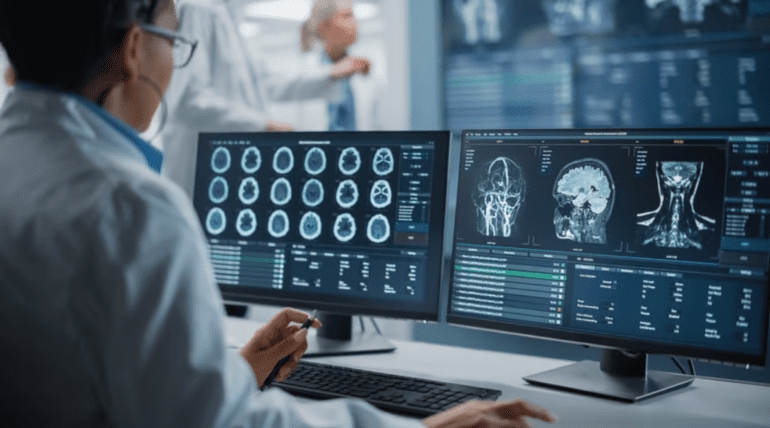TL;DR:
- RSNA’s annual meeting highlights AI’s prominence in medical imaging.
- GE HealthCare emphasizes AI systems to ease healthcare provider burdens.
- Siemens Healthineers pioneers generative AI for imaging and clinical reports.
- Philips addresses radiologist burnout with cloud-based HealthSuite Imaging.
- Hologic introduces Genius AI Detection 2.0 to reduce false-positive breast cancer readings.
- Philips unveils the world’s first sealed mobile MRI system, reducing helium usage.
- Siemens Healthineers expands Naeotom Alpha photon-counting CT system.
- GE HealthCare introduces SIGNA Champion, a patient-friendly 1.5T MRI scanner.
Main AI News:
Artificial intelligence once again took center stage at the annual meeting of the Radiological Society of North America (RSNA), where industry giants showcased their cutting-edge technological advancements in the world of medical imaging.
In recent years, imaging diagnostics have dominated the landscape of AI and machine learning-powered products, receiving numerous green lights from the FDA. This surge in approvals encompasses a wide spectrum of applications, from computer vision algorithms to software designed for the interpretation of MRI, CT, and X-ray scans. Leading players like GE HealthCare, Siemens Healthineers, Philips, and Hologic are now determined to sustain this momentum. This week, the RSNA’s “AI Showcase” pavilion, hosted within the sprawling McCormick Place convention center in Chicago, boasts the presence of over 90 developers and startups, all eager to demonstrate their contributions to the evolving field of medical imaging.
GE HealthCare, for instance, has laid out ambitious plans to showcase AI-powered systems across its imaging, ultrasound, and digital service offerings. CEO Peter Arduini emphasizes the potential of these innovations to alleviate the burden on frontline healthcare providers by automating routine tasks and addressing the root causes of burnout. Arduini elaborates, stating that through their intelligent devices, streamlined disease-focused solutions, and digital offerings, they aim to consolidate data at the right time and place, streamlining workflows, enabling precision care, and ultimately improving patient outcomes.
At the RSNA gathering, GE HealthCare unveiled the MyBreastAI Suite, a suite of software tools tailored for mammography workflows, including three programs developed by iCAD. Notably, the company also celebrated its recent FDA clearance for the automated detection of collapsed lungs, solidifying its position at the forefront of AI approvals with a total of 58 to its name.
Siemens Healthineers, on the other hand, has embraced generative AI as a pivotal element of its strategy, pioneering the fusion of imaging scans with clinical reports. The company envisions expanding this technology into a chat system capable of providing clinicians with dynamic and prioritized reports based on diagnostic data. Additionally, Siemens Healthineers plans to integrate generative AI into customer support and medical staff training.
Philips has directed its attention toward addressing clinician burnout, estimating that a significant 45% of radiologists suffer from symptoms of long-term exhaustion due to escalating caseloads. In response, the company introduced HealthSuite Imaging, a cloud-based iteration of its Vue picture archiving and communication system (PACS). This platform facilitates the swift adoption of new AI capabilities by radiologists and clinicians, allowing for remote diagnostic image readings. Philips also unveiled AI Manager, an end-to-end IT solution that seamlessly connects staff with over 100 AI-based workflow applications.
Meanwhile, Hologic has enhanced its mammography software portfolio with the addition of the Genius AI Detection 2.0 deep-learning program. This innovation promises to reduce false-positive readings of breast cancer lesions by a remarkable 70%, compared to its previous ImageChecker CAD platform.
On the hardware front, Philips made waves by introducing the world’s first fully sealed mobile MRI system as part of its “helium-free” portfolio. Unlike traditional MRI scanners that require periodic refilling of liquid helium, these sealed systems come preloaded and eliminate gas leakage. The truck-mounted BlueSeal MR Mobile, equipped with a 1.5T system, is poised to bring imaging services to rural and remote communities, tackling resource limitations, sustainability challenges, and long-term operating costs.
Siemens Healthineers also announced plans to expand its Naeotom Alpha photon-counting CT system into cardiac imaging and scans of hearts with extensive calcification or stents. The company’s commitment to photon-counting detector production is evident in its €80 million ($86 million) investment at its site in Forchheim, Germany. Their ambitious goal is to scan one billion patients over the next decade, with over 500,000 already benefiting from this revolutionary technology.
In another revelation, GE HealthCare introduced the forthcoming SIGNA Champion, a wide-bore 1.5T MRI scanner designed to enhance the patient experience. With a larger opening and efficient AI software tools, the company aims to offer a quicker and more comfortable scanning experience, particularly catering to patients who face difficulties lying on their backs, such as pregnant or bariatric individuals, or those dealing with significant pain, osteoporosis, or breathing issues. While SIGNA Champion awaits clearance in the U.S. and Europe, its promise of innovation looms large in the world of medical imaging.
Conclusion:
The RSNA event underscores the growing influence of AI in the medical imaging market. Leading companies like GE, Siemens, Philips, and Hologic are investing heavily in AI-powered solutions to enhance diagnostic accuracy, improve workflow efficiency, and alleviate the burden on healthcare providers. This trend reflects a shift towards more automated and data-driven healthcare practices, promising increased precision and improved patient outcomes in the evolving medical imaging landscape.

